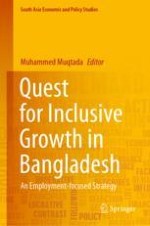2020 | OriginalPaper | Buchkapitel
2. The Quest for an Inclusive Growth Strategy
verfasst von : Muhammed Muqtada, Fahmida Khatun
Erschienen in: Quest for Inclusive Growth in Bangladesh
Verlag: Springer Singapore
Aktivieren Sie unsere intelligente Suche, um passende Fachinhalte oder Patente zu finden.
Wählen Sie Textabschnitte aus um mit Künstlicher Intelligenz passenden Patente zu finden. powered by
Markieren Sie Textabschnitte, um KI-gestützt weitere passende Inhalte zu finden. powered by
